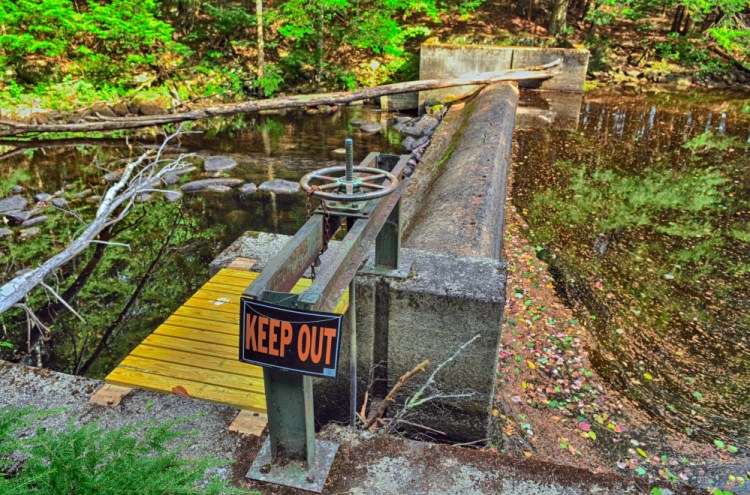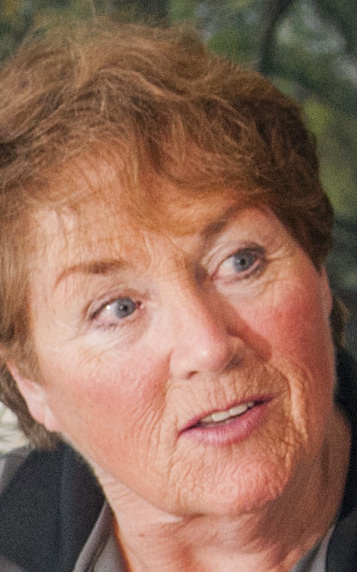PALERMO — Frustration was running high Tuesday among the people gathered in the Palermo Consolidated School gymnasium.
About 100 seasonal and permanent residents around Sheepscot Pond were trying to get up to speed on a legislative proposal introduced earlier this year that would open their lake to the annual migrations of alewives, American eels and lamprey eels.
They want no part of the plan outlined in L.D. 922 that directs the commissioner of the Maine Department of Marine Resources to open the fishway at the south end of Sheepscot Pond – town residents refer to it as Sheepscot Lake – for the spring spawning of alewife and eel populations.
They fear those species will bring diseases that will jeopardize both the fish in the lake and at the Palermo State Fish Hatchery, the fish cultural station managed by the state Department of Inland Fisheries & Wildlife at the south end of the pond below the dam and fishway. Residents say the only benefit is that the lobster fishery can have ready access to more cheap bait.
They said they want a three-year moratorium so that an analysis of the fishery and the dam can be completed and an environmental impact statement can be developed.
A BIGGER WORLD
The bill sponsor sees it differently.
“This is not so anyone can make money harvesting alewives for cheap bait,” said Rep. Jeffrey Pierce, R-Dresden.
The proposal, he said, is meant to ensure the health of the Sheepscot watershed, which extends from a point in Montville in Waldo County south into Lincoln County through Whitefield, Alna and Wiscasset and out to Sheepscot Bay between Georgetown Island and Southport.
“I know these people have some information, and their hackles are up,” he said. “I don’t fault them at all. They are looking at their little piece of the world. But they live in the bigger world, and we all want a healthy ecosystem.”
Pierce grew up in Augusta and remembers when the Kennebec River was colored by the dyes being used at the woolen mills along the river and when sewage flowed into the river unregulated.
“I remember the death of the Atlantic salmon run in 1978 in Bond Brook,” he said.
Since then, local governments have invested millions of dollars to treat sewage, and nonprofit conservation groups have worked to restore natural habitats.
Where waterways have been opened up to native migrating fish species, he said, the health of the system has improved.
The issue is complicated by the differing interests of the interested parties.
Pierce, who manages an alewife run in Dresden, makes no secret of his role as the founder the Alewife Harvesters of Maine, a nonprofit organization formed to preserve the state’s river fisheries and to promote sustainable harvests. He started the organization in 2007, long before he had any interest in politics. He’s currently the executive director.
“I got interested in it when I saw the restoration efforts and started to see a lot cleaner streams,” he said.
Pierce, who pulled together co-sponsors are legislators of both parties from coastal communities from Brunswick to Machias, said he doesn’t understand why the fishway is closed when he thinks it ought to be open.
As it now stands, the only time the fishway at the outlet of Sheepscot Pond is closed is during May and June, when the fish are migrating.
The alewives bring nutrients from the ocean and deposit them in the fresh water systems they travel through, and they take up phosphorus, one of the contributors of algae blooms that can diminish water quality, Pierce said, and deposit that in the ocean.
From his reading of the Inland Fisheries and Wildlife laws, the state is violating its own laws in failing to open the fishway to the migrating alewives and eels.
Lynda Pound, whose father was chief of fisheries for the state, has been on the lake since 1959, when few homes and camps dotted its shores.
“We’ve always known what was going on with the fisheries, with the fish cultural station, and we understand how rare a lake we have,” Pound, who is a member of the Sheepscot Lake Association, said.
The 1,200-acre lake is home to a self-sustaining togue, or lake trout.
At its deepest point, the lake is 140 feet deep, and in many places it’s at least 100 feet deep.
“They are not stocked,” Pound said. “There’s an ecological balance in the lake that allows them to reproduce and stay strong and healthy in large numbers.”
HEALTH OF THE LAKE
The Sheepscot Lake Association, formed several years ago, works to monitor the lake’s health and maintain its quality. Among its regular tasks is deploying a Secchi disk to measure water clarity and an oxygen meter to keep track of those levels for the deep-water game fish.
They watch for milfoil and other invasive plant species, and their dues pay for weekend boat inspectors to make sure no invasives are transported into the pond.
The association also has launched a “lake smart” program to promote low-impact development.
“Do you realize this is the only lake with a fish cultural station that they are trying to put alewives in?” Pound said.
The proposal risks quite a bit in exchange for only a marginal increase in the alewife population, she said.
“It’s not the same lake it was 60 years ago,” she said. “You are looking to restore something to a point where it no longer really makes sense to this community.”
When the public hearing on the bill was held in the Legislature earlier this year, a number of groups, including the Atlantic Salmon Federation, testified in favor of the proposal.
They far outnumbered those that are seeking to delay it.
Andrew Goode, vice president of U.S. programs for the Atlantic Salmon Federation, said his organization has bought the dam at another pond – Branch Pond – and the transaction closed last week.
Residents around that lake are welcoming the fishway, he said. But at 300 acres, Branch Pond has only a fraction of the potential for supporting alewives that the 1,200-acre Sheepscot Pond has.
“For the watershed to function as it needs to and be as healthy as it can be, we should have free passage of all the native species of fish,” Goode said.
Even so, the federation supported holding the bill over to see whether any kind of consensus can be reached.
Goode said changes could be made that would not alter the lake level but would allow for the downstream passage of migratory fish.
“Our overarching desire is not to force anything down on anyone, but to bring forth and share good science and good decisions,” he said. “We don’t like to work against people. We like to work with people, and we’ll find a solution for this.”
When the Legislature meets again, a second public hearing on the measure will be held.
Senate President Michael Thibodeau, R-Winterport, whose district includes Palermo, urged the residents to attend that hearing and show the same degree of passion they demonstrated in the school gymnasium.
Jessica Lowell can be contacted at 621-5632 or at:
jlowell@centralmaine.com
Twitter: JLowellKJ
Copy the Story LinkSend questions/comments to the editors.




Success. Please wait for the page to reload. If the page does not reload within 5 seconds, please refresh the page.
Enter your email and password to access comments.
Hi, to comment on stories you must . This profile is in addition to your subscription and website login.
Already have a commenting profile? .
Invalid username/password.
Please check your email to confirm and complete your registration.
Only subscribers are eligible to post comments. Please subscribe or login first for digital access. Here’s why.
Use the form below to reset your password. When you've submitted your account email, we will send an email with a reset code.